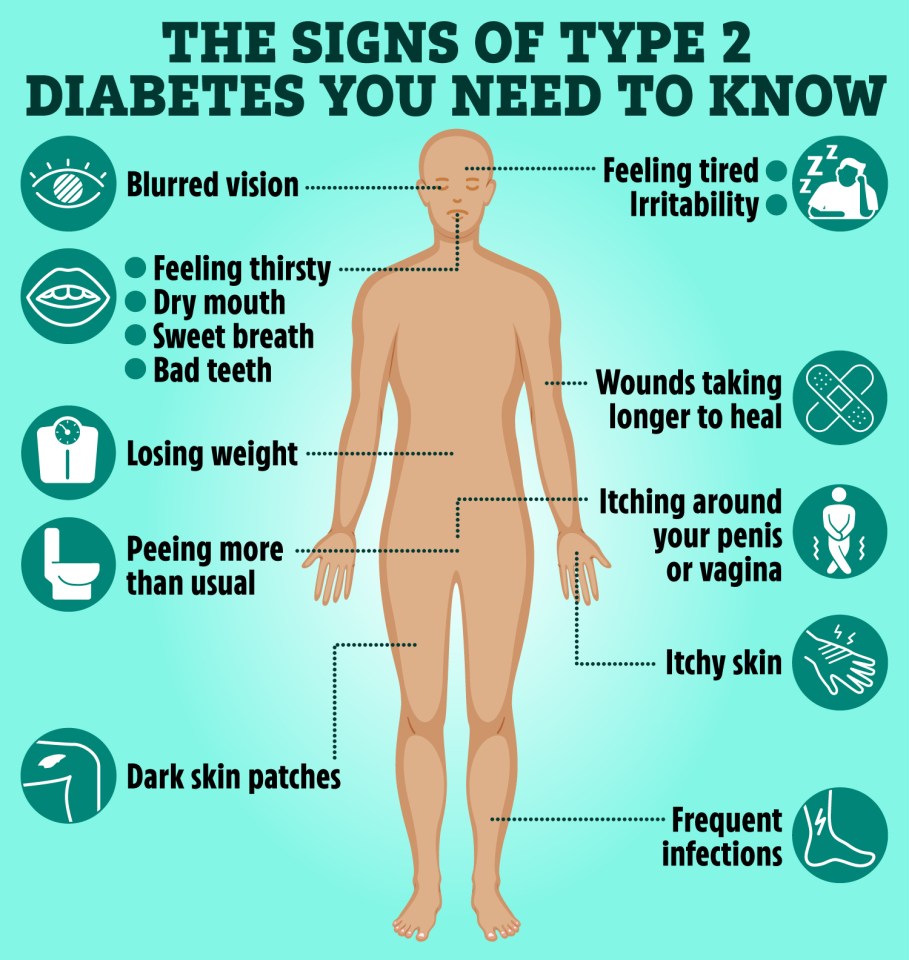From head-to-toe – all the signs of type 2 diabetes you need to know as 1.2million go undiagnosed
MORE than one million Brits are likely living with type 2 diabetes with no idea, a charity warns.
The condition can go undetected for years because its symptoms can be hard to spot or brushed off as something else.
An estimated 3.2million are at increased risk.
Type 2 diabetes causes high blood sugar levels that can lead to serious complications if left untreated.
Experts are especially worried about the number of young people at risk.
Although older adults are more likely to have type 2 diabetes, younger adults are more likely to be undiagnosed if they do have it, according to estimates.
Read more on type 2 diabetes
Some 50 per cent of those aged 16 to 44 years with the condition are undiagnosed, compared with 27 per cent of those aged 75 years and over, figures suggest.
Nikki Joule of Diabetes UK, previously said: “These figures reveal a shockingly high number of people living with diabetes without a diagnosis, while millions more are at high risk of developing it.
“We’re particularly concerned about the worrying proportion of younger people who are undiagnosed, as we know type 2 diabetes is more aggressive in younger people.
“The findings are a reminder of just how important it is for type 2 diabetes to be detected and diagnosed as early as possible to reduce the risk of devastating complications.”
What are the symptoms of diabetes?
According to the NHS, the symptoms of type 2 diabetes to watch out for include:
- Peeing more than usual, particularly at night
- Feeling thirsty all the time
- Feeling very tired
- Losing weight without trying to
- Itching around your penis or vagina, or repeatedly getting thrush
- Getting cuts or wounds taking longer to heal
- Having blurred vision
High blood pressure, high cholesterol and type 2 diabetes are all dubbed ‘silent killers’ – should we really be that worried?
These are the most common signs that are typically reported by those suffering from the condition.
You should visit your GP if you experience any of these symptoms.
However, there are a number of other rarer symptoms that may alert you to this disease.
These include:
- Dark skin patches
- Frequent infections
- Itchy skin
- Dry mouth
- Irritability
- Sweet breath
- Tingling or numbness
- Bad teeth
What are the risk factors for type 2 diabetes?
You are more at risk of developing type 2 diabetes if you are over 40, or 25 for South Asian people.
Having a close relative with type 2 diabetes, such as a parent, brother, or sister, also leaves you at higher risk – as does being overweight or obese, or having a larger waistline.
Those who are South Asian, Chinese, African Caribbean or black of African origin – even if you were born in the UK – are also at increased risk.
You can take an online test to find out your risk of the disease.
The rapid quiz asks about age, weight, if someone in the family has diabetes and if you have been told you have high blood pressure, for example.
It will then give a score between zero and 47 points.
The higher the number, the more likely it is that a person will develop type 2 diabetes in the next 10 years.
For example, one out of four people deemed high risk will get type 2 diabetes in the coming decade.
If someone’s score is moderate or high, they can refer themselves to a local service for support remotely or online without having to go through a healthcare professional.
It doesn’t necessarily mean someone has prediabetes – when blood sugar levels are higher than normal but not high enough to be considered type 2 diabetes – but they should be monitored.
How do I treat type 2 diabetes?
If you’re diagnosed with type 2 diabetes, you’ll need to eat healthily, take regular exercise and have frequent checks, including blood tests.
Try to quit if you smoke, and cut down on alcohol.
Type 2 diabetes can get worse over time, and people living with the condition often need medicine, usually in the form of tablets or injections.
Read More on The US Sun
However, some people can put their type 2 diabetes into remission by losing weight, where their blood sugar is reduced below the diabetes range.
This can often be done through a low-calorie diet, but this is not suitable for everyone, so it’s important to get medical advice first.
What is the difference between type 1 and type 2 diabetes?
IF you have type 1 or type 2 diabetes, it means there’s too much glucose (a type of sugar) in your blood due to a problem with the hormone insulin.
Both are serious conditions that can lead to serious health complications.
However, there are differences in the causes, onset of symptoms and treatment of type 1 diabetes and type 2 diabetes.
TYPE 1
Type 1 diabetes is an autoimmune condition and accounts for five to 10 per cent of all people diagnosed with diabetes.
The body’s immune system attacks the pancreas and destroys the cells that produce insulin.
TYPE 2
Type 2 diabetes accounts for 90 to 95 per cent of all patients with diabetes.
With this form of the disease, cells in the body become resistant to insulin, so a greater amount of insulin is needed to keep blood glucose levels within a normal range.
Type 2 is usually brought on by certain lifestyle factors, such as being overweight.
Note: Thank you for visiting our website! We strive to keep you informed with the latest updates based on expected timelines, although please note that we are not affiliated with any official bodies. Our team is committed to ensuring accuracy and transparency in our reporting, verifying all information before publication. We aim to bring you reliable news, and if you have any questions or concerns about our content, feel free to reach out to us via email. We appreciate your trust and support!














